Postpartum Depression: Symptoms, Diagnosis, Treatment and Support
VerifiedAdded on 2023/01/11
|9
|2857
|29
Report
AI Summary
This report provides a comprehensive overview of postpartum depression, a mood disorder affecting mothers after childbirth. It details diagnostic criteria, key symptoms like mood swings, anxiety, and fatigue, and explores the prodromal phase. The report examines various treatment approaches, including lifestyle changes, non-pharmacological therapies like cognitive behavioral therapy and psychotherapy, and pharmacological interventions such as antidepressants and mood stabilizers, including tricyclic antidepressants. It also analyzes how mood disorders and lack of treatment affect the individual's development, and explores the impact of caring for a person with postpartum depression on carers and family members, emphasizing the importance of support systems. Finally, it outlines the role of a multidisciplinary team, including doctors, nurses, and mental health professionals, in managing clients with mood disorders, emphasizing the importance of early intervention and comprehensive care. The report stresses the importance of family and friends in providing support to help with recovery.
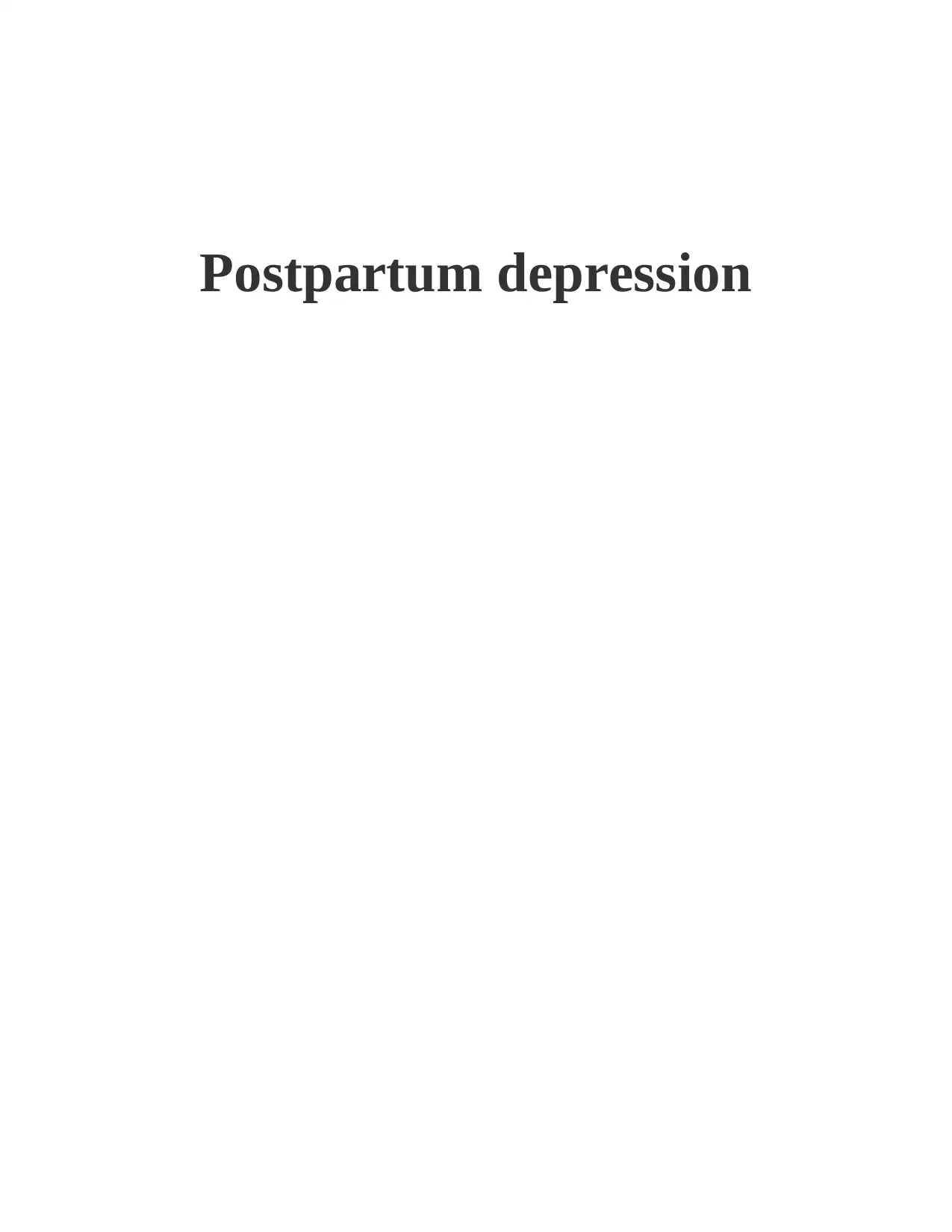
Postpartum depression
Paraphrase This Document
Need a fresh take? Get an instant paraphrase of this document with our AI Paraphraser
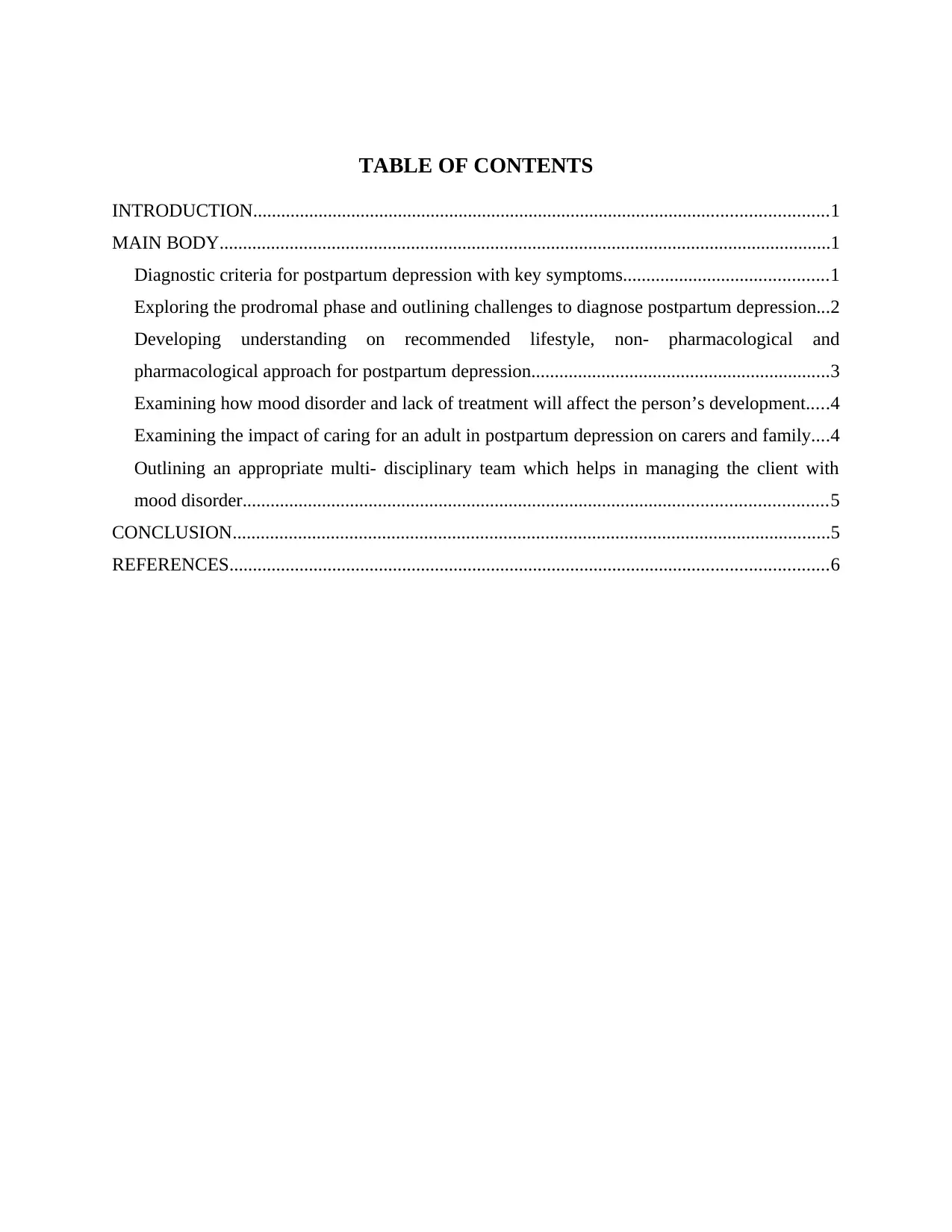
TABLE OF CONTENTS
INTRODUCTION...........................................................................................................................1
MAIN BODY...................................................................................................................................1
Diagnostic criteria for postpartum depression with key symptoms............................................1
Exploring the prodromal phase and outlining challenges to diagnose postpartum depression...2
Developing understanding on recommended lifestyle, non- pharmacological and
pharmacological approach for postpartum depression................................................................3
Examining how mood disorder and lack of treatment will affect the person’s development.....4
Examining the impact of caring for an adult in postpartum depression on carers and family....4
Outlining an appropriate multi- disciplinary team which helps in managing the client with
mood disorder.............................................................................................................................5
CONCLUSION................................................................................................................................5
REFERENCES................................................................................................................................6
INTRODUCTION...........................................................................................................................1
MAIN BODY...................................................................................................................................1
Diagnostic criteria for postpartum depression with key symptoms............................................1
Exploring the prodromal phase and outlining challenges to diagnose postpartum depression...2
Developing understanding on recommended lifestyle, non- pharmacological and
pharmacological approach for postpartum depression................................................................3
Examining how mood disorder and lack of treatment will affect the person’s development.....4
Examining the impact of caring for an adult in postpartum depression on carers and family....4
Outlining an appropriate multi- disciplinary team which helps in managing the client with
mood disorder.............................................................................................................................5
CONCLUSION................................................................................................................................5
REFERENCES................................................................................................................................6
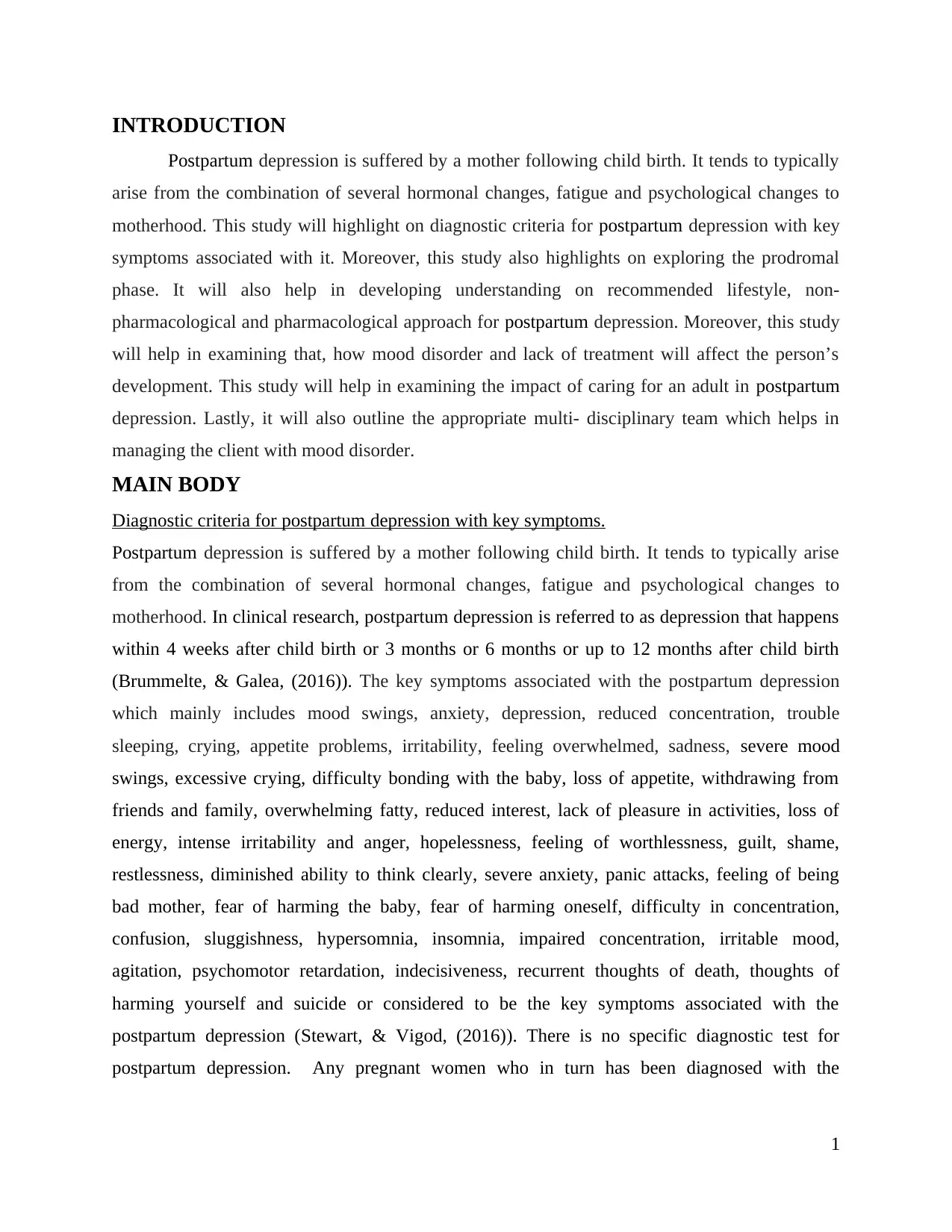
INTRODUCTION
Postpartum depression is suffered by a mother following child birth. It tends to typically
arise from the combination of several hormonal changes, fatigue and psychological changes to
motherhood. This study will highlight on diagnostic criteria for postpartum depression with key
symptoms associated with it. Moreover, this study also highlights on exploring the prodromal
phase. It will also help in developing understanding on recommended lifestyle, non-
pharmacological and pharmacological approach for postpartum depression. Moreover, this study
will help in examining that, how mood disorder and lack of treatment will affect the person’s
development. This study will help in examining the impact of caring for an adult in postpartum
depression. Lastly, it will also outline the appropriate multi- disciplinary team which helps in
managing the client with mood disorder.
MAIN BODY
Diagnostic criteria for postpartum depression with key symptoms.
Postpartum depression is suffered by a mother following child birth. It tends to typically arise
from the combination of several hormonal changes, fatigue and psychological changes to
motherhood. In clinical research, postpartum depression is referred to as depression that happens
within 4 weeks after child birth or 3 months or 6 months or up to 12 months after child birth
(Brummelte, & Galea, (2016)). The key symptoms associated with the postpartum depression
which mainly includes mood swings, anxiety, depression, reduced concentration, trouble
sleeping, crying, appetite problems, irritability, feeling overwhelmed, sadness, severe mood
swings, excessive crying, difficulty bonding with the baby, loss of appetite, withdrawing from
friends and family, overwhelming fatty, reduced interest, lack of pleasure in activities, loss of
energy, intense irritability and anger, hopelessness, feeling of worthlessness, guilt, shame,
restlessness, diminished ability to think clearly, severe anxiety, panic attacks, feeling of being
bad mother, fear of harming the baby, fear of harming oneself, difficulty in concentration,
confusion, sluggishness, hypersomnia, insomnia, impaired concentration, irritable mood,
agitation, psychomotor retardation, indecisiveness, recurrent thoughts of death, thoughts of
harming yourself and suicide or considered to be the key symptoms associated with the
postpartum depression (Stewart, & Vigod, (2016)). There is no specific diagnostic test for
postpartum depression. Any pregnant women who in turn has been diagnosed with the
1
Postpartum depression is suffered by a mother following child birth. It tends to typically
arise from the combination of several hormonal changes, fatigue and psychological changes to
motherhood. This study will highlight on diagnostic criteria for postpartum depression with key
symptoms associated with it. Moreover, this study also highlights on exploring the prodromal
phase. It will also help in developing understanding on recommended lifestyle, non-
pharmacological and pharmacological approach for postpartum depression. Moreover, this study
will help in examining that, how mood disorder and lack of treatment will affect the person’s
development. This study will help in examining the impact of caring for an adult in postpartum
depression. Lastly, it will also outline the appropriate multi- disciplinary team which helps in
managing the client with mood disorder.
MAIN BODY
Diagnostic criteria for postpartum depression with key symptoms.
Postpartum depression is suffered by a mother following child birth. It tends to typically arise
from the combination of several hormonal changes, fatigue and psychological changes to
motherhood. In clinical research, postpartum depression is referred to as depression that happens
within 4 weeks after child birth or 3 months or 6 months or up to 12 months after child birth
(Brummelte, & Galea, (2016)). The key symptoms associated with the postpartum depression
which mainly includes mood swings, anxiety, depression, reduced concentration, trouble
sleeping, crying, appetite problems, irritability, feeling overwhelmed, sadness, severe mood
swings, excessive crying, difficulty bonding with the baby, loss of appetite, withdrawing from
friends and family, overwhelming fatty, reduced interest, lack of pleasure in activities, loss of
energy, intense irritability and anger, hopelessness, feeling of worthlessness, guilt, shame,
restlessness, diminished ability to think clearly, severe anxiety, panic attacks, feeling of being
bad mother, fear of harming the baby, fear of harming oneself, difficulty in concentration,
confusion, sluggishness, hypersomnia, insomnia, impaired concentration, irritable mood,
agitation, psychomotor retardation, indecisiveness, recurrent thoughts of death, thoughts of
harming yourself and suicide or considered to be the key symptoms associated with the
postpartum depression (Stewart, & Vigod, (2016)). There is no specific diagnostic test for
postpartum depression. Any pregnant women who in turn has been diagnosed with the
1
⊘ This is a preview!⊘
Do you want full access?
Subscribe today to unlock all pages.

Trusted by 1+ million students worldwide
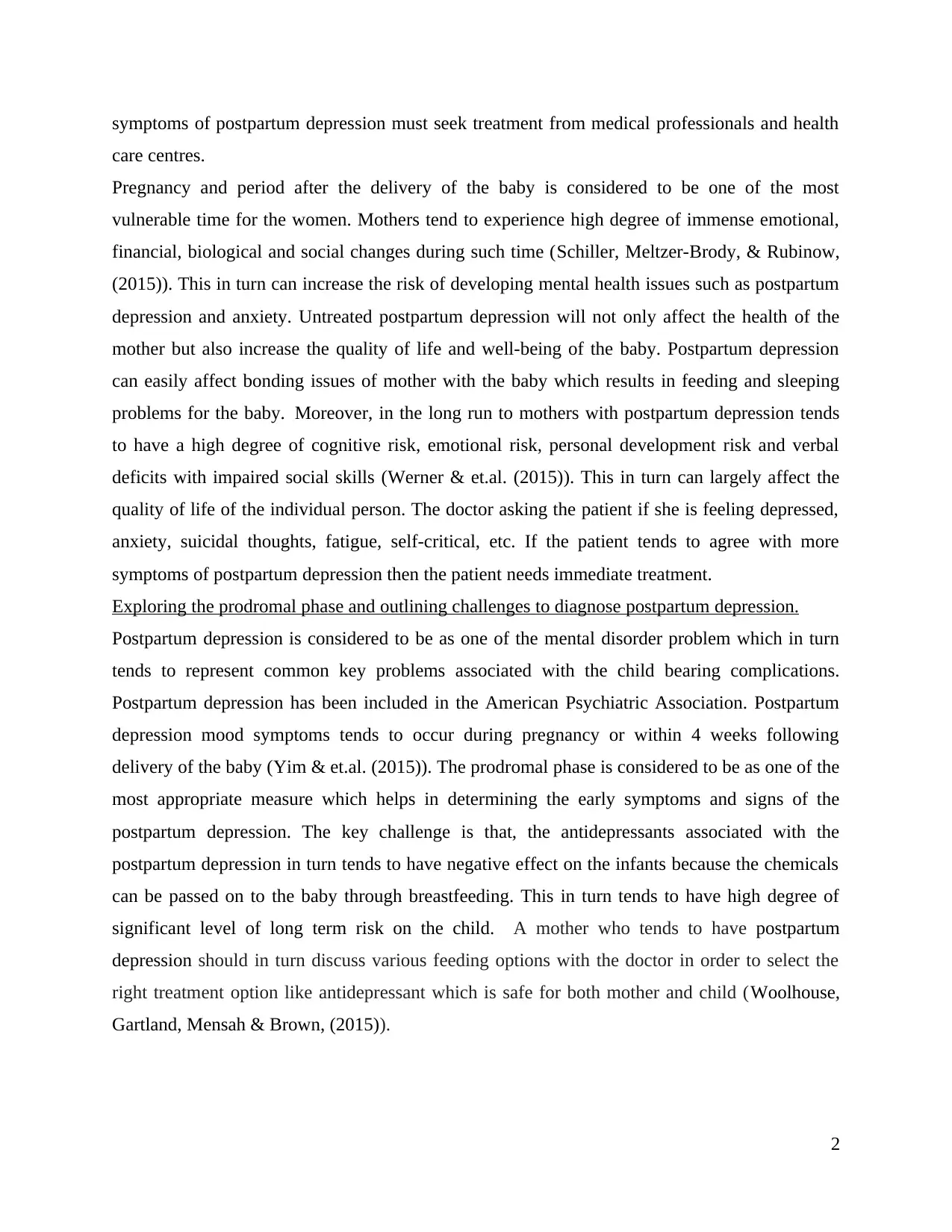
symptoms of postpartum depression must seek treatment from medical professionals and health
care centres.
Pregnancy and period after the delivery of the baby is considered to be one of the most
vulnerable time for the women. Mothers tend to experience high degree of immense emotional,
financial, biological and social changes during such time (Schiller, Meltzer-Brody, & Rubinow,
(2015)). This in turn can increase the risk of developing mental health issues such as postpartum
depression and anxiety. Untreated postpartum depression will not only affect the health of the
mother but also increase the quality of life and well-being of the baby. Postpartum depression
can easily affect bonding issues of mother with the baby which results in feeding and sleeping
problems for the baby. Moreover, in the long run to mothers with postpartum depression tends
to have a high degree of cognitive risk, emotional risk, personal development risk and verbal
deficits with impaired social skills (Werner & et.al. (2015)). This in turn can largely affect the
quality of life of the individual person. The doctor asking the patient if she is feeling depressed,
anxiety, suicidal thoughts, fatigue, self-critical, etc. If the patient tends to agree with more
symptoms of postpartum depression then the patient needs immediate treatment.
Exploring the prodromal phase and outlining challenges to diagnose postpartum depression.
Postpartum depression is considered to be as one of the mental disorder problem which in turn
tends to represent common key problems associated with the child bearing complications.
Postpartum depression has been included in the American Psychiatric Association. Postpartum
depression mood symptoms tends to occur during pregnancy or within 4 weeks following
delivery of the baby (Yim & et.al. (2015)). The prodromal phase is considered to be as one of the
most appropriate measure which helps in determining the early symptoms and signs of the
postpartum depression. The key challenge is that, the antidepressants associated with the
postpartum depression in turn tends to have negative effect on the infants because the chemicals
can be passed on to the baby through breastfeeding. This in turn tends to have high degree of
significant level of long term risk on the child. A mother who tends to have postpartum
depression should in turn discuss various feeding options with the doctor in order to select the
right treatment option like antidepressant which is safe for both mother and child (Woolhouse,
Gartland, Mensah & Brown, (2015)).
2
care centres.
Pregnancy and period after the delivery of the baby is considered to be one of the most
vulnerable time for the women. Mothers tend to experience high degree of immense emotional,
financial, biological and social changes during such time (Schiller, Meltzer-Brody, & Rubinow,
(2015)). This in turn can increase the risk of developing mental health issues such as postpartum
depression and anxiety. Untreated postpartum depression will not only affect the health of the
mother but also increase the quality of life and well-being of the baby. Postpartum depression
can easily affect bonding issues of mother with the baby which results in feeding and sleeping
problems for the baby. Moreover, in the long run to mothers with postpartum depression tends
to have a high degree of cognitive risk, emotional risk, personal development risk and verbal
deficits with impaired social skills (Werner & et.al. (2015)). This in turn can largely affect the
quality of life of the individual person. The doctor asking the patient if she is feeling depressed,
anxiety, suicidal thoughts, fatigue, self-critical, etc. If the patient tends to agree with more
symptoms of postpartum depression then the patient needs immediate treatment.
Exploring the prodromal phase and outlining challenges to diagnose postpartum depression.
Postpartum depression is considered to be as one of the mental disorder problem which in turn
tends to represent common key problems associated with the child bearing complications.
Postpartum depression has been included in the American Psychiatric Association. Postpartum
depression mood symptoms tends to occur during pregnancy or within 4 weeks following
delivery of the baby (Yim & et.al. (2015)). The prodromal phase is considered to be as one of the
most appropriate measure which helps in determining the early symptoms and signs of the
postpartum depression. The key challenge is that, the antidepressants associated with the
postpartum depression in turn tends to have negative effect on the infants because the chemicals
can be passed on to the baby through breastfeeding. This in turn tends to have high degree of
significant level of long term risk on the child. A mother who tends to have postpartum
depression should in turn discuss various feeding options with the doctor in order to select the
right treatment option like antidepressant which is safe for both mother and child (Woolhouse,
Gartland, Mensah & Brown, (2015)).
2
Paraphrase This Document
Need a fresh take? Get an instant paraphrase of this document with our AI Paraphraser
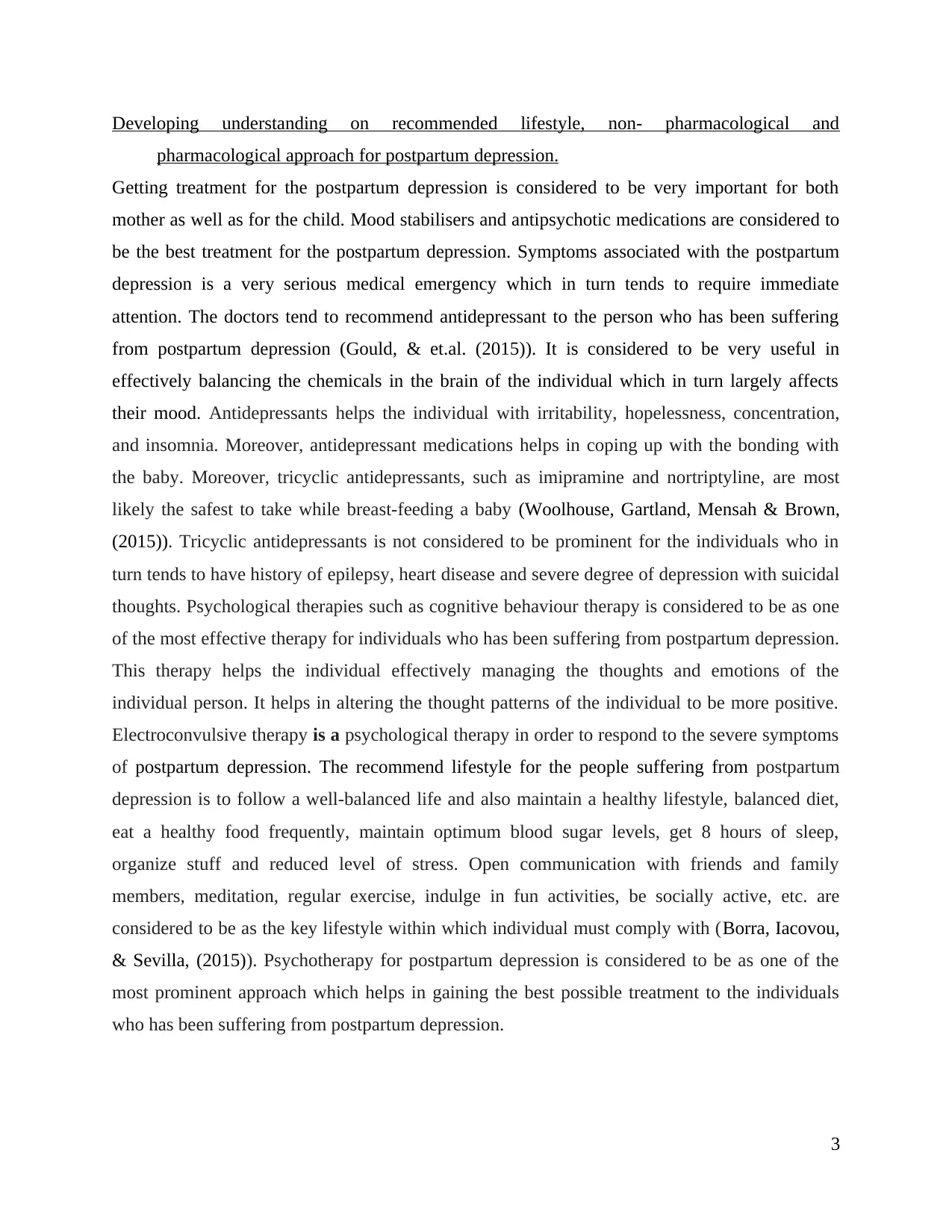
Developing understanding on recommended lifestyle, non- pharmacological and
pharmacological approach for postpartum depression.
Getting treatment for the postpartum depression is considered to be very important for both
mother as well as for the child. Mood stabilisers and antipsychotic medications are considered to
be the best treatment for the postpartum depression. Symptoms associated with the postpartum
depression is a very serious medical emergency which in turn tends to require immediate
attention. The doctors tend to recommend antidepressant to the person who has been suffering
from postpartum depression (Gould, & et.al. (2015)). It is considered to be very useful in
effectively balancing the chemicals in the brain of the individual which in turn largely affects
their mood. Antidepressants helps the individual with irritability, hopelessness, concentration,
and insomnia. Moreover, antidepressant medications helps in coping up with the bonding with
the baby. Moreover, tricyclic antidepressants, such as imipramine and nortriptyline, are most
likely the safest to take while breast-feeding a baby (Woolhouse, Gartland, Mensah & Brown,
(2015)). Tricyclic antidepressants is not considered to be prominent for the individuals who in
turn tends to have history of epilepsy, heart disease and severe degree of depression with suicidal
thoughts. Psychological therapies such as cognitive behaviour therapy is considered to be as one
of the most effective therapy for individuals who has been suffering from postpartum depression.
This therapy helps the individual effectively managing the thoughts and emotions of the
individual person. It helps in altering the thought patterns of the individual to be more positive.
Electroconvulsive therapy is a psychological therapy in order to respond to the severe symptoms
of postpartum depression. The recommend lifestyle for the people suffering from postpartum
depression is to follow a well-balanced life and also maintain a healthy lifestyle, balanced diet,
eat a healthy food frequently, maintain optimum blood sugar levels, get 8 hours of sleep,
organize stuff and reduced level of stress. Open communication with friends and family
members, meditation, regular exercise, indulge in fun activities, be socially active, etc. are
considered to be as the key lifestyle within which individual must comply with (Borra, Iacovou,
& Sevilla, (2015)). Psychotherapy for postpartum depression is considered to be as one of the
most prominent approach which helps in gaining the best possible treatment to the individuals
who has been suffering from postpartum depression.
3
pharmacological approach for postpartum depression.
Getting treatment for the postpartum depression is considered to be very important for both
mother as well as for the child. Mood stabilisers and antipsychotic medications are considered to
be the best treatment for the postpartum depression. Symptoms associated with the postpartum
depression is a very serious medical emergency which in turn tends to require immediate
attention. The doctors tend to recommend antidepressant to the person who has been suffering
from postpartum depression (Gould, & et.al. (2015)). It is considered to be very useful in
effectively balancing the chemicals in the brain of the individual which in turn largely affects
their mood. Antidepressants helps the individual with irritability, hopelessness, concentration,
and insomnia. Moreover, antidepressant medications helps in coping up with the bonding with
the baby. Moreover, tricyclic antidepressants, such as imipramine and nortriptyline, are most
likely the safest to take while breast-feeding a baby (Woolhouse, Gartland, Mensah & Brown,
(2015)). Tricyclic antidepressants is not considered to be prominent for the individuals who in
turn tends to have history of epilepsy, heart disease and severe degree of depression with suicidal
thoughts. Psychological therapies such as cognitive behaviour therapy is considered to be as one
of the most effective therapy for individuals who has been suffering from postpartum depression.
This therapy helps the individual effectively managing the thoughts and emotions of the
individual person. It helps in altering the thought patterns of the individual to be more positive.
Electroconvulsive therapy is a psychological therapy in order to respond to the severe symptoms
of postpartum depression. The recommend lifestyle for the people suffering from postpartum
depression is to follow a well-balanced life and also maintain a healthy lifestyle, balanced diet,
eat a healthy food frequently, maintain optimum blood sugar levels, get 8 hours of sleep,
organize stuff and reduced level of stress. Open communication with friends and family
members, meditation, regular exercise, indulge in fun activities, be socially active, etc. are
considered to be as the key lifestyle within which individual must comply with (Borra, Iacovou,
& Sevilla, (2015)). Psychotherapy for postpartum depression is considered to be as one of the
most prominent approach which helps in gaining the best possible treatment to the individuals
who has been suffering from postpartum depression.
3
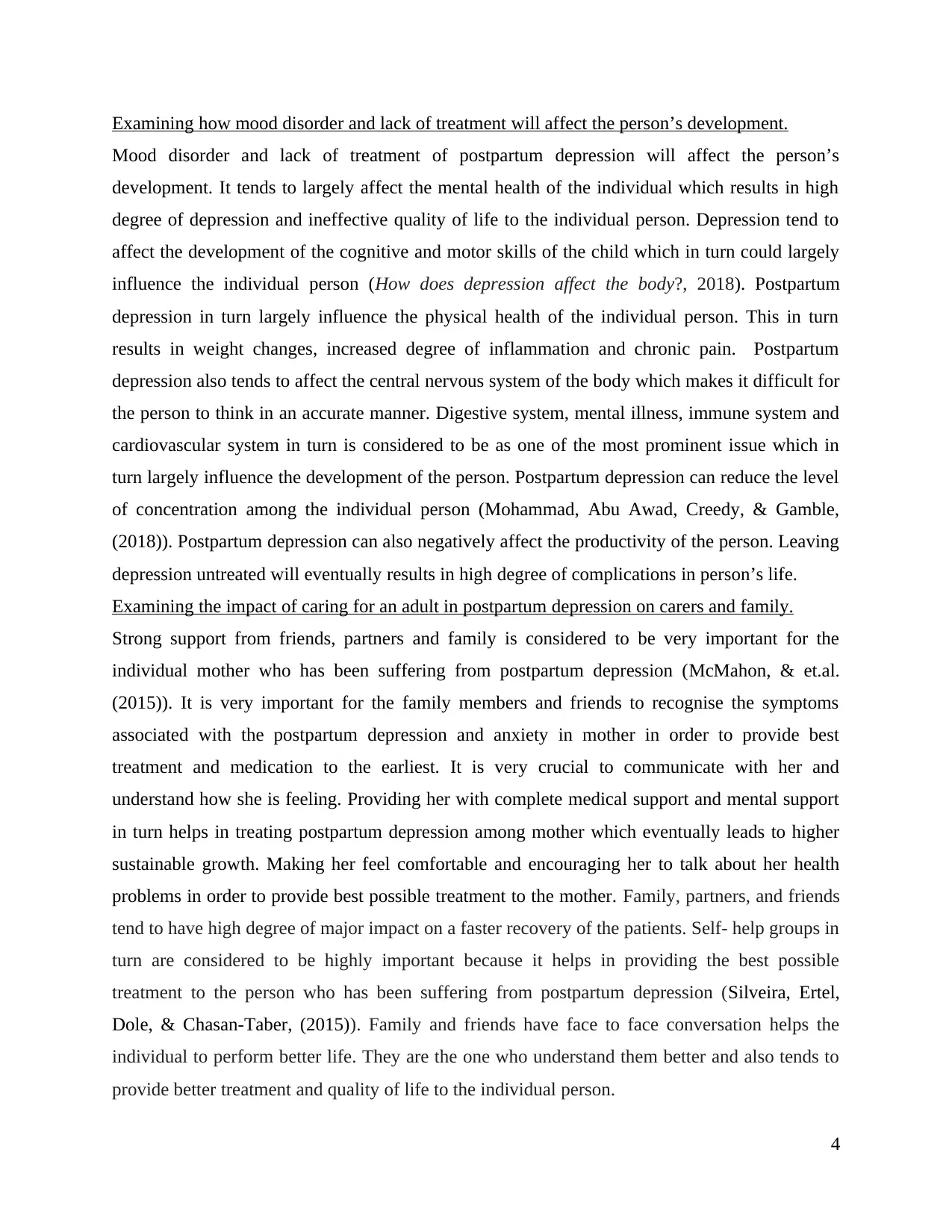
Examining how mood disorder and lack of treatment will affect the person’s development.
Mood disorder and lack of treatment of postpartum depression will affect the person’s
development. It tends to largely affect the mental health of the individual which results in high
degree of depression and ineffective quality of life to the individual person. Depression tend to
affect the development of the cognitive and motor skills of the child which in turn could largely
influence the individual person (How does depression affect the body?, 2018). Postpartum
depression in turn largely influence the physical health of the individual person. This in turn
results in weight changes, increased degree of inflammation and chronic pain. Postpartum
depression also tends to affect the central nervous system of the body which makes it difficult for
the person to think in an accurate manner. Digestive system, mental illness, immune system and
cardiovascular system in turn is considered to be as one of the most prominent issue which in
turn largely influence the development of the person. Postpartum depression can reduce the level
of concentration among the individual person (Mohammad, Abu Awad, Creedy, & Gamble,
(2018)). Postpartum depression can also negatively affect the productivity of the person. Leaving
depression untreated will eventually results in high degree of complications in person’s life.
Examining the impact of caring for an adult in postpartum depression on carers and family.
Strong support from friends, partners and family is considered to be very important for the
individual mother who has been suffering from postpartum depression (McMahon, & et.al.
(2015)). It is very important for the family members and friends to recognise the symptoms
associated with the postpartum depression and anxiety in mother in order to provide best
treatment and medication to the earliest. It is very crucial to communicate with her and
understand how she is feeling. Providing her with complete medical support and mental support
in turn helps in treating postpartum depression among mother which eventually leads to higher
sustainable growth. Making her feel comfortable and encouraging her to talk about her health
problems in order to provide best possible treatment to the mother. Family, partners, and friends
tend to have high degree of major impact on a faster recovery of the patients. Self- help groups in
turn are considered to be highly important because it helps in providing the best possible
treatment to the person who has been suffering from postpartum depression (Silveira, Ertel,
Dole, & Chasan-Taber, (2015)). Family and friends have face to face conversation helps the
individual to perform better life. They are the one who understand them better and also tends to
provide better treatment and quality of life to the individual person.
4
Mood disorder and lack of treatment of postpartum depression will affect the person’s
development. It tends to largely affect the mental health of the individual which results in high
degree of depression and ineffective quality of life to the individual person. Depression tend to
affect the development of the cognitive and motor skills of the child which in turn could largely
influence the individual person (How does depression affect the body?, 2018). Postpartum
depression in turn largely influence the physical health of the individual person. This in turn
results in weight changes, increased degree of inflammation and chronic pain. Postpartum
depression also tends to affect the central nervous system of the body which makes it difficult for
the person to think in an accurate manner. Digestive system, mental illness, immune system and
cardiovascular system in turn is considered to be as one of the most prominent issue which in
turn largely influence the development of the person. Postpartum depression can reduce the level
of concentration among the individual person (Mohammad, Abu Awad, Creedy, & Gamble,
(2018)). Postpartum depression can also negatively affect the productivity of the person. Leaving
depression untreated will eventually results in high degree of complications in person’s life.
Examining the impact of caring for an adult in postpartum depression on carers and family.
Strong support from friends, partners and family is considered to be very important for the
individual mother who has been suffering from postpartum depression (McMahon, & et.al.
(2015)). It is very important for the family members and friends to recognise the symptoms
associated with the postpartum depression and anxiety in mother in order to provide best
treatment and medication to the earliest. It is very crucial to communicate with her and
understand how she is feeling. Providing her with complete medical support and mental support
in turn helps in treating postpartum depression among mother which eventually leads to higher
sustainable growth. Making her feel comfortable and encouraging her to talk about her health
problems in order to provide best possible treatment to the mother. Family, partners, and friends
tend to have high degree of major impact on a faster recovery of the patients. Self- help groups in
turn are considered to be highly important because it helps in providing the best possible
treatment to the person who has been suffering from postpartum depression (Silveira, Ertel,
Dole, & Chasan-Taber, (2015)). Family and friends have face to face conversation helps the
individual to perform better life. They are the one who understand them better and also tends to
provide better treatment and quality of life to the individual person.
4
⊘ This is a preview!⊘
Do you want full access?
Subscribe today to unlock all pages.

Trusted by 1+ million students worldwide
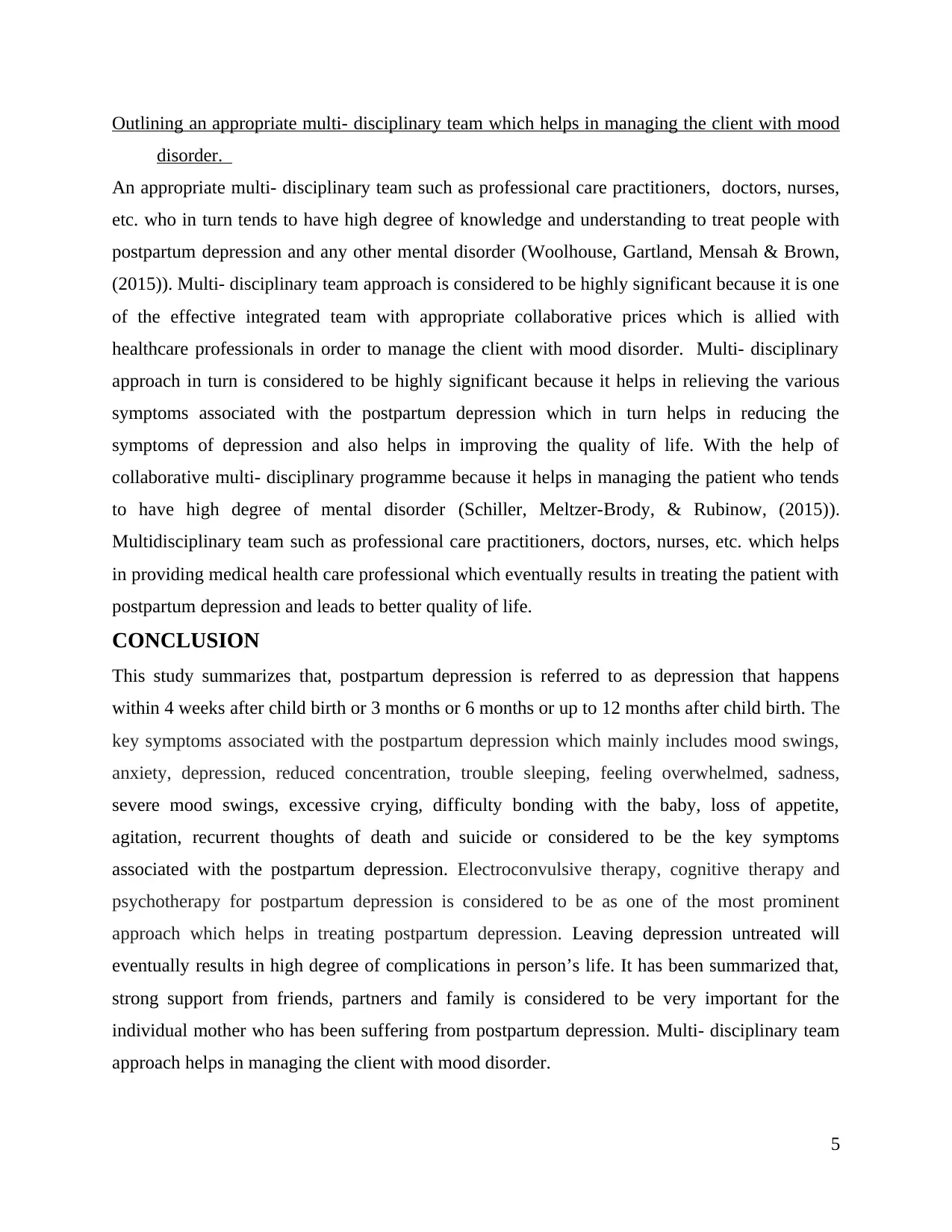
Outlining an appropriate multi- disciplinary team which helps in managing the client with mood
disorder.
An appropriate multi- disciplinary team such as professional care practitioners, doctors, nurses,
etc. who in turn tends to have high degree of knowledge and understanding to treat people with
postpartum depression and any other mental disorder (Woolhouse, Gartland, Mensah & Brown,
(2015)). Multi- disciplinary team approach is considered to be highly significant because it is one
of the effective integrated team with appropriate collaborative prices which is allied with
healthcare professionals in order to manage the client with mood disorder. Multi- disciplinary
approach in turn is considered to be highly significant because it helps in relieving the various
symptoms associated with the postpartum depression which in turn helps in reducing the
symptoms of depression and also helps in improving the quality of life. With the help of
collaborative multi- disciplinary programme because it helps in managing the patient who tends
to have high degree of mental disorder (Schiller, Meltzer-Brody, & Rubinow, (2015)).
Multidisciplinary team such as professional care practitioners, doctors, nurses, etc. which helps
in providing medical health care professional which eventually results in treating the patient with
postpartum depression and leads to better quality of life.
CONCLUSION
This study summarizes that, postpartum depression is referred to as depression that happens
within 4 weeks after child birth or 3 months or 6 months or up to 12 months after child birth. The
key symptoms associated with the postpartum depression which mainly includes mood swings,
anxiety, depression, reduced concentration, trouble sleeping, feeling overwhelmed, sadness,
severe mood swings, excessive crying, difficulty bonding with the baby, loss of appetite,
agitation, recurrent thoughts of death and suicide or considered to be the key symptoms
associated with the postpartum depression. Electroconvulsive therapy, cognitive therapy and
psychotherapy for postpartum depression is considered to be as one of the most prominent
approach which helps in treating postpartum depression. Leaving depression untreated will
eventually results in high degree of complications in person’s life. It has been summarized that,
strong support from friends, partners and family is considered to be very important for the
individual mother who has been suffering from postpartum depression. Multi- disciplinary team
approach helps in managing the client with mood disorder.
5
disorder.
An appropriate multi- disciplinary team such as professional care practitioners, doctors, nurses,
etc. who in turn tends to have high degree of knowledge and understanding to treat people with
postpartum depression and any other mental disorder (Woolhouse, Gartland, Mensah & Brown,
(2015)). Multi- disciplinary team approach is considered to be highly significant because it is one
of the effective integrated team with appropriate collaborative prices which is allied with
healthcare professionals in order to manage the client with mood disorder. Multi- disciplinary
approach in turn is considered to be highly significant because it helps in relieving the various
symptoms associated with the postpartum depression which in turn helps in reducing the
symptoms of depression and also helps in improving the quality of life. With the help of
collaborative multi- disciplinary programme because it helps in managing the patient who tends
to have high degree of mental disorder (Schiller, Meltzer-Brody, & Rubinow, (2015)).
Multidisciplinary team such as professional care practitioners, doctors, nurses, etc. which helps
in providing medical health care professional which eventually results in treating the patient with
postpartum depression and leads to better quality of life.
CONCLUSION
This study summarizes that, postpartum depression is referred to as depression that happens
within 4 weeks after child birth or 3 months or 6 months or up to 12 months after child birth. The
key symptoms associated with the postpartum depression which mainly includes mood swings,
anxiety, depression, reduced concentration, trouble sleeping, feeling overwhelmed, sadness,
severe mood swings, excessive crying, difficulty bonding with the baby, loss of appetite,
agitation, recurrent thoughts of death and suicide or considered to be the key symptoms
associated with the postpartum depression. Electroconvulsive therapy, cognitive therapy and
psychotherapy for postpartum depression is considered to be as one of the most prominent
approach which helps in treating postpartum depression. Leaving depression untreated will
eventually results in high degree of complications in person’s life. It has been summarized that,
strong support from friends, partners and family is considered to be very important for the
individual mother who has been suffering from postpartum depression. Multi- disciplinary team
approach helps in managing the client with mood disorder.
5
Paraphrase This Document
Need a fresh take? Get an instant paraphrase of this document with our AI Paraphraser
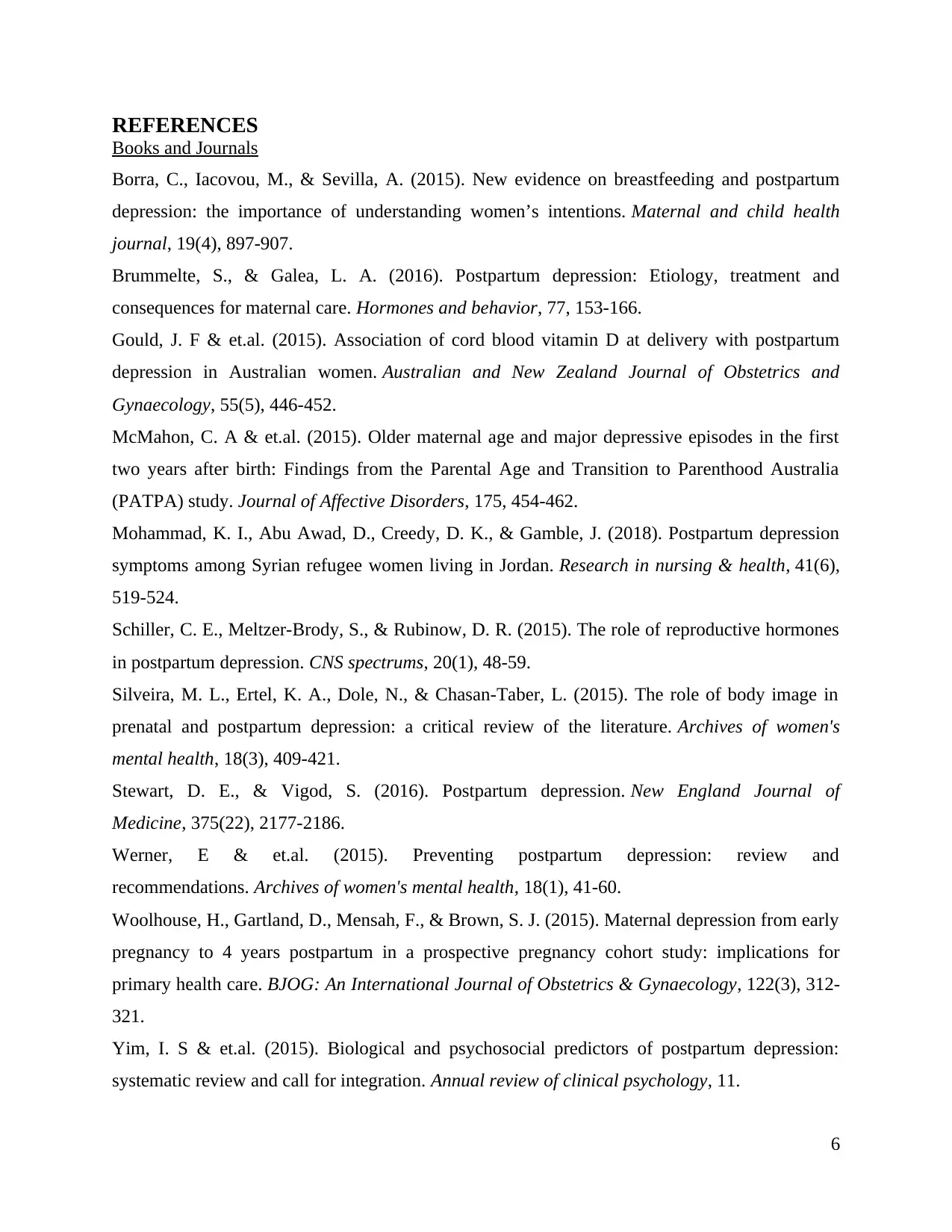
REFERENCES
Books and Journals
Borra, C., Iacovou, M., & Sevilla, A. (2015). New evidence on breastfeeding and postpartum
depression: the importance of understanding women’s intentions. Maternal and child health
journal, 19(4), 897-907.
Brummelte, S., & Galea, L. A. (2016). Postpartum depression: Etiology, treatment and
consequences for maternal care. Hormones and behavior, 77, 153-166.
Gould, J. F & et.al. (2015). Association of cord blood vitamin D at delivery with postpartum
depression in Australian women. Australian and New Zealand Journal of Obstetrics and
Gynaecology, 55(5), 446-452.
McMahon, C. A & et.al. (2015). Older maternal age and major depressive episodes in the first
two years after birth: Findings from the Parental Age and Transition to Parenthood Australia
(PATPA) study. Journal of Affective Disorders, 175, 454-462.
Mohammad, K. I., Abu Awad, D., Creedy, D. K., & Gamble, J. (2018). Postpartum depression
symptoms among Syrian refugee women living in Jordan. Research in nursing & health, 41(6),
519-524.
Schiller, C. E., Meltzer-Brody, S., & Rubinow, D. R. (2015). The role of reproductive hormones
in postpartum depression. CNS spectrums, 20(1), 48-59.
Silveira, M. L., Ertel, K. A., Dole, N., & Chasan-Taber, L. (2015). The role of body image in
prenatal and postpartum depression: a critical review of the literature. Archives of women's
mental health, 18(3), 409-421.
Stewart, D. E., & Vigod, S. (2016). Postpartum depression. New England Journal of
Medicine, 375(22), 2177-2186.
Werner, E & et.al. (2015). Preventing postpartum depression: review and
recommendations. Archives of women's mental health, 18(1), 41-60.
Woolhouse, H., Gartland, D., Mensah, F., & Brown, S. J. (2015). Maternal depression from early
pregnancy to 4 years postpartum in a prospective pregnancy cohort study: implications for
primary health care. BJOG: An International Journal of Obstetrics & Gynaecology, 122(3), 312-
321.
Yim, I. S & et.al. (2015). Biological and psychosocial predictors of postpartum depression:
systematic review and call for integration. Annual review of clinical psychology, 11.
6
Books and Journals
Borra, C., Iacovou, M., & Sevilla, A. (2015). New evidence on breastfeeding and postpartum
depression: the importance of understanding women’s intentions. Maternal and child health
journal, 19(4), 897-907.
Brummelte, S., & Galea, L. A. (2016). Postpartum depression: Etiology, treatment and
consequences for maternal care. Hormones and behavior, 77, 153-166.
Gould, J. F & et.al. (2015). Association of cord blood vitamin D at delivery with postpartum
depression in Australian women. Australian and New Zealand Journal of Obstetrics and
Gynaecology, 55(5), 446-452.
McMahon, C. A & et.al. (2015). Older maternal age and major depressive episodes in the first
two years after birth: Findings from the Parental Age and Transition to Parenthood Australia
(PATPA) study. Journal of Affective Disorders, 175, 454-462.
Mohammad, K. I., Abu Awad, D., Creedy, D. K., & Gamble, J. (2018). Postpartum depression
symptoms among Syrian refugee women living in Jordan. Research in nursing & health, 41(6),
519-524.
Schiller, C. E., Meltzer-Brody, S., & Rubinow, D. R. (2015). The role of reproductive hormones
in postpartum depression. CNS spectrums, 20(1), 48-59.
Silveira, M. L., Ertel, K. A., Dole, N., & Chasan-Taber, L. (2015). The role of body image in
prenatal and postpartum depression: a critical review of the literature. Archives of women's
mental health, 18(3), 409-421.
Stewart, D. E., & Vigod, S. (2016). Postpartum depression. New England Journal of
Medicine, 375(22), 2177-2186.
Werner, E & et.al. (2015). Preventing postpartum depression: review and
recommendations. Archives of women's mental health, 18(1), 41-60.
Woolhouse, H., Gartland, D., Mensah, F., & Brown, S. J. (2015). Maternal depression from early
pregnancy to 4 years postpartum in a prospective pregnancy cohort study: implications for
primary health care. BJOG: An International Journal of Obstetrics & Gynaecology, 122(3), 312-
321.
Yim, I. S & et.al. (2015). Biological and psychosocial predictors of postpartum depression:
systematic review and call for integration. Annual review of clinical psychology, 11.
6
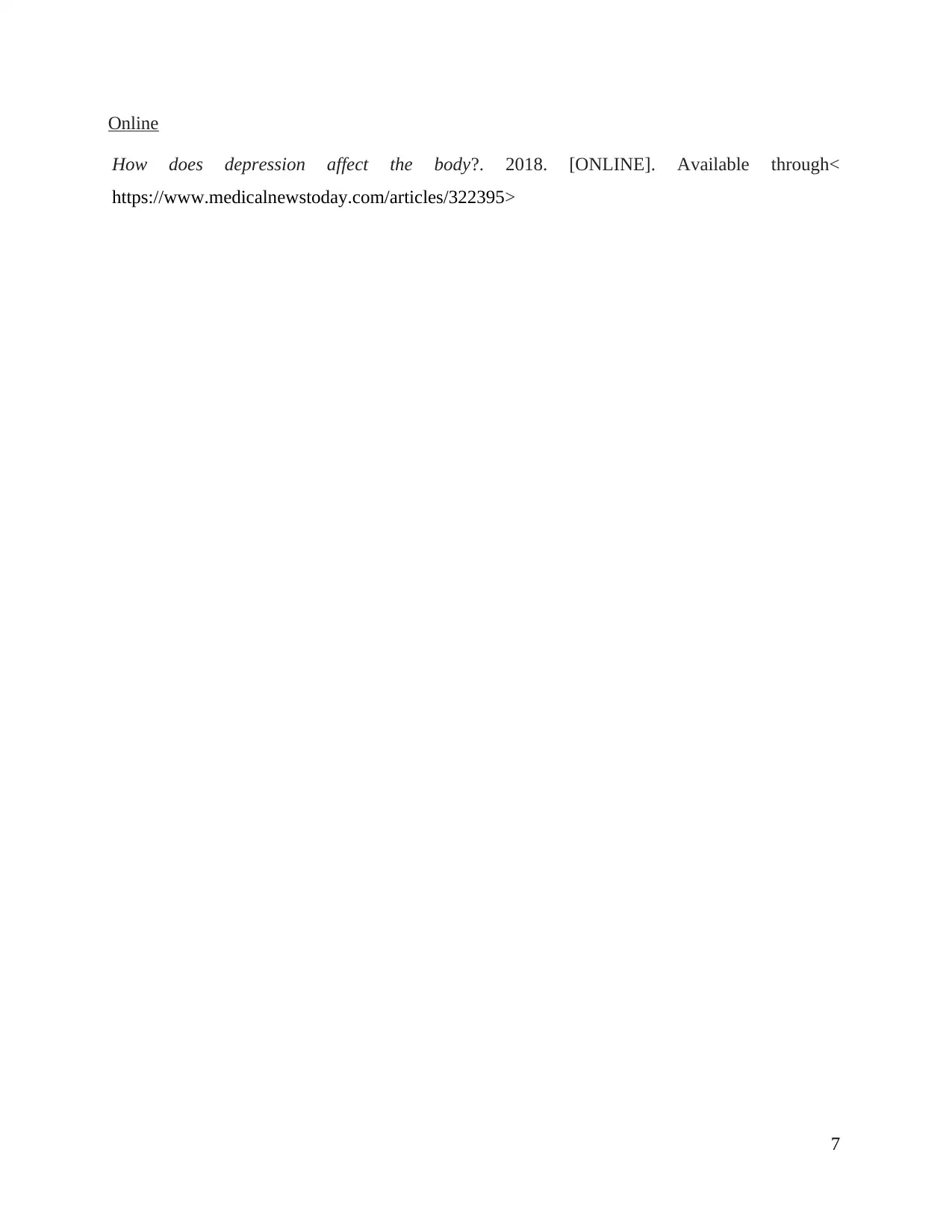
Online
How does depression affect the body?. 2018. [ONLINE]. Available through<
https://www.medicalnewstoday.com/articles/322395>
7
How does depression affect the body?. 2018. [ONLINE]. Available through<
https://www.medicalnewstoday.com/articles/322395>
7
⊘ This is a preview!⊘
Do you want full access?
Subscribe today to unlock all pages.

Trusted by 1+ million students worldwide
1 out of 9
Your All-in-One AI-Powered Toolkit for Academic Success.
+13062052269
info@desklib.com
Available 24*7 on WhatsApp / Email
![[object Object]](/_next/static/media/star-bottom.7253800d.svg)
Unlock your academic potential
Copyright © 2020–2026 A2Z Services. All Rights Reserved. Developed and managed by ZUCOL.
